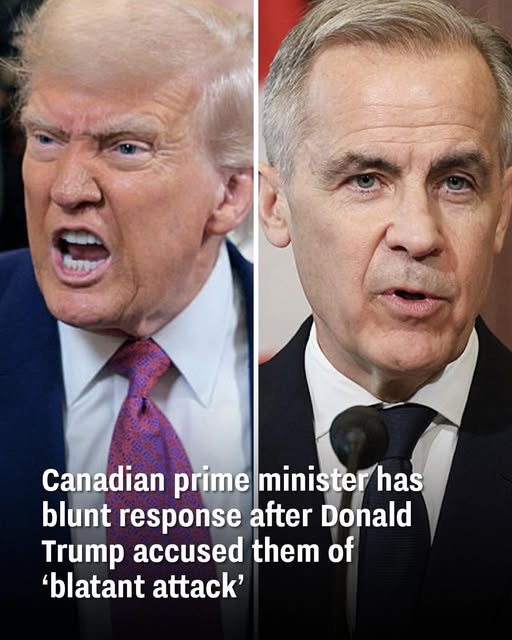
Tensions Boil Over: U.S. and Canada Locked in High-Stakes Trade Showdown
A once-steady alliance is showing serious cracks as trade friction explodes into a diplomatic standoff—fueled by taxes, tech, and testosterone.
What began as routine trade talks between the U.S. and Canada has erupted into a full-blown crisis, marked by fiery rhetoric, stalled negotiations, and the rekindling of long-standing grievances. A new Canadian tax measure—seemingly technical on the surface—has ignited a political firestorm, with both countries digging in for what could become a drawn-out economic brawl.
The Flashpoint: Canada’s Digital Services Tax
At the center of the storm is Canada’s recently enacted Digital Services Tax, a 3% levy aimed at digital giants like Google, Amazon, Meta, and Airbnb. The goal? To ensure that companies profiting from Canadian users pay a fair share into the nation’s coffers.
But there’s a twist: the tax is retroactive, covering revenue earned since 2022. That could leave American tech firms on the hook for roughly $2 billion—to be paid within weeks.
Trump Responds: Fury on Truth Social
The backlash from Washington was immediate and explosive. Former President Donald Trump, currently seeking re-election, launched a blistering response on Truth Social, branding the tax an “obvious and unacceptable assault” on the United States.
“Canada—a difficult country to trade with—has just slapped our tech companies with a retroactive tax. We’re done talking,” Trump declared. “All trade discussions are now terminated.”
The post sent shockwaves through both capitals, effectively halting negotiations on a revised version of the USMCA trade agreement and triggering a wave of emergency diplomacy behind closed doors.
Carney Stays Cool
In stark contrast, Canadian Prime Minister Mark Carney maintained a calm and calculated tone. When pressed for a response, Carney simply said, “We’ll continue to conduct these complex negotiations in the best interests of Canadians.”
His understated reply was widely praised across Canadian media, with many casting him as the steady hand in a political storm. But that didn’t stop Trump from doubling down later that day.
“We have tremendous leverage over Canada,” he warned during a White House press briefing. “They were foolish to go down this path. They can remove the tax, or face consequences.”
From Tax Policy to Trade War
The timing of the dispute couldn’t be more volatile. Both nations were already engaged in sensitive talks to modernize the USMCA. Canada has long pushed back against what it sees as American economic strong-arming, while the Trump administration has prioritized defending U.S. corporate interests—especially in the tech sector.
Political analysts say the digital tax dispute is less about the tax itself and more about leverage.
“The law was passed a year ago—it’s not new,” noted Daniel Béland, a political science professor at McGill University. “But Trump is seizing the moment, using the controversy to stir nationalist sentiment and extract concessions.”
The Global Context: Canada Isn’t Alone
Canada’s move mirrors similar digital taxes already adopted by France, Italy, Spain, and other nations. These policies reflect a growing international push to ensure digital giants pay taxes where they operate—not just where they’re headquartered.
The OECD has tried to forge a global agreement on digital taxation, but progress has been slow. In the meantime, countries are going their own way—and the U.S. has responded with threats of tariffs and trade penalties.
Business Caught in the Crossfire
Reaction from the tech sector has been swift. American companies are lobbying hard against the tax, particularly the retroactive aspect, which some argue violates international trade norms.
In Canada, reactions are mixed. Domestic firms that compete with American tech companies see the tax as overdue. But exporters—especially in agriculture, manufacturing, and autos—fear U.S. retaliation could hit them hard.
What’s Next: Countdown to Confrontation
Trump has given Canada a seven-day ultimatum to reverse course or face retaliatory tariffs. With talks frozen and rhetoric escalating, observers warn that a full-blown trade war could be just days away.
Still, behind-the-scenes diplomacy is likely to continue. Both economies are deeply intertwined, and a long-term breakdown would be costly for both sides.
Bigger Than a Tax: A Test of Sovereignty and Strength
This clash isn’t just about digital revenue—it’s about sovereignty, national pride, and leadership styles. For Trump, it’s a chance to flex political muscle and rally a nationalist base. For Carney, it’s a high-stakes test of principled governance and strategic patience.
As the world watches, the future of U.S.-Canada trade relations hangs in the balance—proof that even the closest allies can find themselves on the brink when politics, profits, and pride collide.